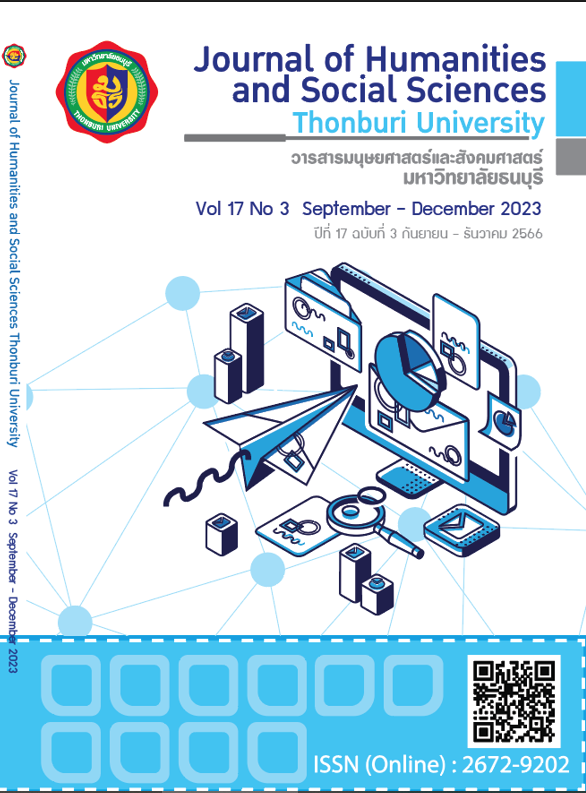การพัฒนารูปแบบการถ่ายทอดสดบนสื่อสังคมออนไลน์สำหรับกิจกรรมการตระหนักรู้ การใช้เวลาว่างของนิสิตระดับปริญญาตรี สาขาวิชาผู้นำนันทนาการ คณะพลศึกษา มหาวิทยาลัยศรีนครินทรวิโรฒ
คำสำคัญ:
การถ่ายทอดสด, สื่อสังคมออนไลน์, การถ่ายทอดสดบนสื่อสังคมออนไลน์, การตระหนักรู้การใช้เวลาว่างบทคัดย่อ
การวิจัยนี้มีจุดมุ่งหมายเพื่อพัฒนารูปแบบการถ่ายทอดสดและศึกษาผลของรูปแบบการถ่ายทอดสดบนสื่อสังคมออนไลน์สำหรับกิจกรรมการตระหนักรู้การใช้เวลาว่าง กลุ่มตัวอย่างคือนิสิตระดับปริญญาตรี สาขาวิชาผู้นำนันทนาการ ชั้นปีที่ 2 คณะพลศึกษา มหาวิทยาลัยศรีนครินทรวิโรฒ จำนวน 30 คน เครื่องมือที่ใช้ในการวิจัย ได้แก่ รูปแบบการถ่ายทอดสด แบบสังเกตแบบมีโครงสร้าง แบบประเมินคุณภาพ แบบสอบถามความพึงพอใจ แบบสังเกตความพึงพอใจ แบบสัมภาษณ์แบบมีโครงสร้าง และแบบบรรยายเหตุการณ์สำคัญ ผู้วิจัยทำการวิเคราะห์ข้อมูลเชิงปริมาณโดยใช้ค่าเฉลี่ย ค่าเบี่ยงเบนมาตรฐาน และค่าที (t-test dependent) และวิเคราะห์ข้อมูลเชิงคุณภาพด้วยวิธีการเปรียบเทียบความคงที่ของข้อมูลและวิธีการสามเส้า ผลการวิจัยมีดังนี้ 1) ได้รูปแบบการถ่ายทอดสดบนสื่อสังคมออนไลน์สำหรับกิจกรรมการตระหนักรู้การใช้เวลาว่างที่มีคุณภาพ 2) ผลการประเมินรูปแบบการถ่ายทอดสดบนสื่อสังคมออนไลน์โดยผู้เชี่ยวชาญโดยรวมอยู่ในระดับดีมาก 3) ผลการเรียนรู้หลังการเข้าร่วมกิจกรรมมีค่าเฉลี่ยสูงกว่าก่อนเข้าร่วมกิจกรรมอย่างมีนัยสำคัญทางสถิติที่ระดับ .05 4) ความพึงพอใจต่อรูปแบบการถ่ายทอดสดโดยรวมอยู่ในระดับมากที่สุด
เอกสารอ้างอิง
คมสิทธิ์ เกียนวัฒนา. (2566). การจัดการกิจกรรมนันทนาการทองเที่ยวภายหลังวิกฤตโควิด-19. วารสารมหาวิทยาลัยคริสเตียน. 29(2): 72-84.
ชูศรี วงศ์รัตนะ. (2560). เทคนิคการใช้สถิติเพื่อการวิจัย. พิมพ์ครั้งที่ 13. กรุงเทพฯ: ศูนย์หนังสือจุฬาลงกรณ์มหาวิทยาลัย.
ธวัชโชค สุวรรณโชติ, ณัชชา อริยะอรุโณทัย, ชนิดาภา จันทร์เจริญ, พรณิชา วิศาลธนกุล, วจพัฒน์ โกสลานนท์ (2563). ความพึงพอใจที่มีต่อการจัดกิจกรรมนันทนาการผ่านระบบออนไลน์ของกรมพลศึกษา. การค้นคว้าอิสระ ศศ.บ.ผู้นำนันทนาการ, มหาวิทยาลัยศรีนครินทรวิโรฒ.
ปิญญ์สลิชา เจริญพูล. (2561). รูปแบบและวิธีการการถ่ายทอดสดผานเฟซบุ๊คของร้านขายสินค้าแฟชั่นออนไลน์. การค้นคว้าอิสระ นศ.ม.สาขาวิชานิเทศศาสตร์, มหาวิทยาลัยธุรกิจบัณฑิตย์.
วิพงษ์ชัย ร้องขันแก้ว. (2565). เทคโนโลยีและสื่อดิจิทัลเพื่อนันทนาการ. นครนายก: คณะพลศึกษา มหาวิทยาลัยศรีนครินทรวิโรฒ.
สาลี่ สุภาภรณ์. (2550). วิจัยเชิงคุณภาพทางพลศึกษาและกีฬา. กรุงเทพฯ: สามลดา.
Dattilo, J. (2008). Leisure Education Program Planning: A Systematic Approach. 3rded. PA: Venture Publishing.
Mundy, J. (1998). Leisure Education: Theory and Practice. PA: Sagamore Publishing.
Translated Thai References
Cheroenpool, P. (2018). The Forms and Methods of Online Fashion Shop’s Facebook Live. Independent Study. (M.Com.Arts. in Communication Arts, Dhurakijpundit University). (in Thai)
Kieanwatana, K. (2023). The Management of Recreational Tourism Activities after the Covid-19 Crisis. Christian University Journal. 29(2): 72-84. (in Thai)
Rongkhankaew, W. (2022). Technology and Digital Media. Nakhon Nayok: Faculty of Physical Education, Srinakharinwirot University. (in Thai)
Supaporn, S. (2007). Qualitative research in physical education and sport. Bangkok: 3 LADA. (in Thai)
Suwannachot, T., Ariyaarunotai, N., Chancharoen, C., Wisanthanakun, P., Kosalanon, W. (2021). The Satisfaction towards online recreation activities of department of physical education. Independent Study. (B.A. in recreation leadership, Srinakharinwirot University). (in Thai)
Wongrattana, C. (2017). Statistical techniques for research. 13thed. Bangkok: Chulalongkorn University Book Center. (in Thai)
ดาวน์โหลด
เผยแพร่แล้ว
รูปแบบการอ้างอิง
ฉบับ
ประเภทบทความ
สัญญาอนุญาต
ลิขสิทธิ์ (c) 2023 วิพงษ์ชัย ร้องขันแก้ว

อนุญาตภายใต้เงื่อนไข Creative Commons Attribution-NonCommercial-NoDerivatives 4.0 International License.
ผลงานที่ปรากฎในวารสารฉบับนี้เป็นลิขสิทธิ์เฉพาะส่วนบุคคลของผู้เขียนซึ่งต้องรับผิดชอบต่อผลทาง กฎหมายที่อาจเกิดขึ้นได้และไม่มีผลต่อกองบรรณาธิการ






